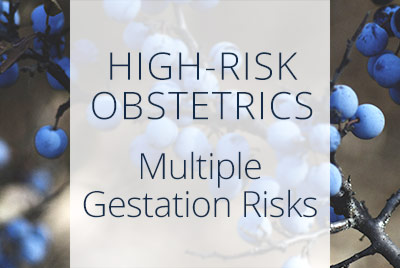â€å“multiple Gestation and Damaged Babies: God's Will or Human Choice?ã¢â‚¬â by Gregory E. Pence
What is Multiple Gestation?
Multiple gestations (or multiple pregnancies) is when a woman is pregnant with more than one fetus. She may be expecting twins, triplets, or more. Most women learn they're pregnant with multiples during the first trimester. The signs of multiple gestations are commonly more severe forms of the symptoms of pregnancy.
In humans, the average length of pregnancy (ii weeks fewer than gestation) is 38 weeks with a single fetus. This average decreases for each additional fetus: to thirty-six weeks for twin births, thirty-two weeks for triplets, and xxx weeks for quadruplets. With the decreasing gestation time possibly causing preterm nascency, the risks from immaturity at birth and subsequent viability increase with the size of the sibling group. Simply equally of the twentieth century accept more than four all survived infancy.
Contempo history has also seen increasing numbers of multiple births. In the Us, information technology has been estimated a higher number of twin births, triplets, and higher-order births have resulted from conception by assisted reproductive engineering science.
Multiple gestations increase the risks of fetal abnormalities
Multiple gestations showroom a pregnant increase in fetal growth abnormalities directly proportional to the number of fetuses. Pregnancies complicated by multiple gestations should be monitored serially for growth with ultrasound imaging. Although i fetus may develop differently (but ordinarily) from the other in terms of size, most fetuses in multifetal pregnancies grow concordantly.
Growth abnormalities include one twin is small-scale for its gestational age, both twins are small for their gestational age, or one twin is significantly smaller than the other twin although neither is small for their gestational age. Nonetheless, in virtually cases, the smaller twin will accept a birth weight less than the tenth percentile. Poor fetal growth may be secondary to placental insufficiency, abnormal placentation, aberrant umbilical cord insertions, and/or intrinsic fetal disease.
Multiple pregnancies, such equally twin pregnancies and triplet pregnancies or more have comprised an increasing proportion of the total pregnancies in the adult earth due to older maternal age at childbirth and the expanded use of infertility treatments.
In that location are Two Types of Multiple Pregnancies
-
Identical
When more than than one fetus originates from the same egg, nosotros call them identical. A single egg is fertilized by a single sperm, and so the egg spontaneously splits into ii genetically identical embryos. It'due south not clear why this happens, and there's no correlation between the likelihood of having identical babies and your race, historic period, or family history.
Identical twin gestation babies will all be the same sex and will have the same blood type. Although identical twins usually look very much the same (aforementioned eye and pilus color, body type, etc), they don't always look 100% identical. Many other factors play a role in shaping your child's advent. They'll even have their own unique fingerprints!
-
Fraternal
When two or more than eggs are fertilized by more than one sperm, the resulting babies are fraternal. Unlike identical pregnancies, fraternal pregnancies exercise run in families. If any relatives on your female parent's side had fraternal twins, the chances that yous will have them too are greater. Fraternal pregnancies are also more than common in women over 35, women of African descent, and women who have simply quit taking birth control pills.
Although fraternal babies are very similar to each other due to having the same parentage, they are genetically dissimilar, and volition likely resemble each other as much every bit ordinary brothers and sisters do. Congenial babies tin be both sexes and may have different blood types.
Fertility Treatment and Multiple Gestations
 Women undergoing fertility treatment are much more likely to take multiple gestations than other women. This is because fertility drugs heave your fertility potential past causing your ovaries to release multiple eggs at a time. This raises the odds that more than ane egg will be fertilized in the aforementioned cycle.
Women undergoing fertility treatment are much more likely to take multiple gestations than other women. This is because fertility drugs heave your fertility potential past causing your ovaries to release multiple eggs at a time. This raises the odds that more than ane egg will be fertilized in the aforementioned cycle.
With in-vitro fertilization, it's common exercise for the doctor to place more than than i fertilized egg in the uterus at a fourth dimension, to increase the chances that at least 1 will implant and gestate to term. Of course, this too increases the likelihood of multiple gestations. The availability of assisted reproductive applied science has contributed to the increment in multiple gestations seen over the by few decades.
Multiple gestations, particularly high-club multiple gestations, remain a significant problem in assisted reproduction, associated with poorer obstetric outcomes and neonatal complications of prematurity and low birth weight. As a effect, numerous approaches have aimed to reduce the rate of multiple gestations.
The Usa has taken a largely voluntary approach, with a serial of published guidelines on the number of embryos transferred. These guidelines, based on age, prognosis, and 24-hour interval of ET, have gradually reduced the acceptable number of transferred embryos, particularly in women age 37 and younger.
Are Multiple Gestations Riskier than Single Pregnancies?
Modern medicine has done wonders for increasing the condom of multiple pregnancies, but they still acquit some risks. Carrying more one babe increases the chances of:
- Pre-eclampsia. This is a affliction that raises your blood force per unit area to dangerous levels.
- Gestational diabetes. Women carrying multiples accept a loftier run a risk of gestational diabetes.
- Preterm birth. Multiple babies are more likely to be born prematurely, which hinders their development and puts their health at chance.
- Birth defects. Certain genetic disorders are more common in multiple gestations.
- Miscarriage of one or more of the fetuses.
- Depression birth weight.
- Cerebral palsy. Preterm multiples also accept a greater risk than unmarried preterm babies of the same gestational age for serious complications that tin atomic number 82 to cerebral palsy.
- Iron-deficiency anemia has also been linked to preterm commitment and other adverse pregnancy outcomes.
- Multiple gestations are associated with an increased risk for intrauterine growth restriction.
Although these atmospheric condition are more mutual with multiple pregnancies than single pregnancies, nearly women conveying multiples have uncomplicated pregnancies that outcome in safety alive births and salubrious children.
What Should I Wait With a Multiple Gestation?
If you are carrying twins, triplets, or more than, your gynecologist will exist able to detect them during a routine ultrasound. You may be able to hear more than than one heartbeat and get dwelling with a sonogram that shows each of your fetuses. Your dr. will besides be able to tell you if they're healthy, and developing as expected.
More frequent prenatal visits. Multiple gestation pregnancies increase the risk of complications. Women with a multifetal pregnancy are usually seen more than regularly by doctors than those with singleton pregnancies because of the higher risks of complications.
Carrying more than than one fetus is harder on your body, so your OB/GYN or health intendance doctor will want to cheque upwards on your wellness as well. You should expect regular blood and urine tests, and conscientious monitoring of your blood pressure. And when y'all are pregnant with twins, y'all demand an extra 600 calories a day. For triplets and more than, weight gain should be individualized to fit your needs.
The typical recommendation for the nascency method of triplets and higher-order multiples is a cesarean delivery, but twins are often delivered vaginally. Multiple-birth infants are ordinarily admitted to neonatal intensive care immediately later being born for examination.
Women with multiples are more likely to exist hospitalized with complications including preterm labor, preterm premature rupture of membranes, preeclampsia, placental abruption, pulmonary embolism, and postpartum hemorrhage.
If you are expecting twins, triplets or more and have any questions or wellness concerns most them or yourself, please talk to your doctor We also invite you to establish care with Dr. Aliabadi. Please click here to make an appointment or call us at (844) 863- 6700.
- Almost
- Latest Posts
![]()
Source: https://www.draliabadi.com/obstetrics/high-risk-obstetrics/multiple-gestation/
 Multiple gestations (or multiple pregnancies) is when a woman is pregnant with more than one fetus. She may be expecting twins, triplets, or more. Most women learn they're pregnant with multiples during the first trimester. The signs of multiple gestations are commonly more severe forms of the symptoms of pregnancy.
Multiple gestations (or multiple pregnancies) is when a woman is pregnant with more than one fetus. She may be expecting twins, triplets, or more. Most women learn they're pregnant with multiples during the first trimester. The signs of multiple gestations are commonly more severe forms of the symptoms of pregnancy.
0 Response to "â€å“multiple Gestation and Damaged Babies: God's Will or Human Choice?ã¢â‚¬â by Gregory E. Pence"
Post a Comment